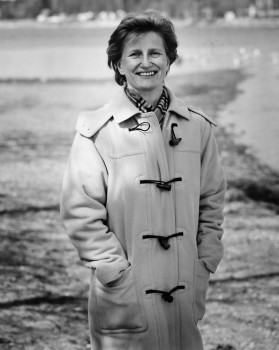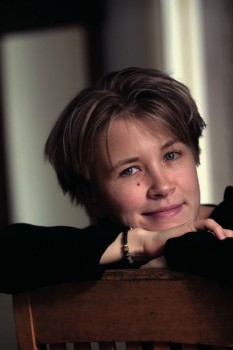Search results for "lola rogers"
New from the archives
19 February 2015 | This 'n' that

Rosa Liksom. Kuva: Pekka Mustonen
When the pseudonymous Rosa Liksom (born 1958; real name Anni Ylävaara) burst on the Finnish literary scene in 1985 with her first book, Yhden yön pysäkki (‘One night stand’), excitement was intense. For a start, she managed to keep her real identity secret, even when she appeared at public events and book-signings; then, she wrote generally in her native northern Finnish dialect, which hadn’t previously been heard very much in literary circles. Her very short short prose charted landscapes also not much represented in literature – the far north, the uneducated, the dispossessed.
This group of seven stories, from her second book, Tyhjän tien paratiisit (‘Paradises of the open road’, 1989), cover territory which has become familiar in her work: a woman who marries a layabout, a bellicose butcher’s son, a cleanliness fanatic for whom hygiene is more important than human relationships….
Rosa Liksom won the Finlandia Prize in 2011 for Hytti nro 6, which was published by Serpent’s Tail, London, in a translation by Lola Rogers last year.
*
The digitisation of Books from Finland continues apace, with a total of 360 articles and book extracts made available online so far. Each week, we bring a newly digitised text to your attention.
When I’m ninety-four
14 November 2013 | Fiction, Prose
An extract from the novel Kuolema Ehtoolehdossa (‘Death in Twilight Grove’, Teos, 2013). Minna Lindgren interviewed by Anna-Leena Ekroos
At the Health Clinic, Siiri Kettunen once more found a new ‘personal physician’ waiting for her. The doctor was so young that Siiri had to ask whether a little girl like her could be a real doctor at all, but that was a mistake. By the time she remembered that there had been a series of articles in the paper about fake doctors, the girl doctor had already taken offence.
‘Shall we get down to business?’ the unknown personal physician said, after a brief lecture. She told Siiri to take off her blouse, then listened to her lungs with an ice-cold stethoscope that almost stopped her heart, and wrote a referral to Meilahti hospital for urgent tests. Apparently the stethoscope was the gizmo that gave the doctor the same kind of certainty that the blood pressure cuff had given the nurse.
‘I can order an ambulance,’ the doctor said, but that was a bit much, in Siiri’s opinion, so she thanked her politely for listening to her lungs and promised to catch the very next tram to the heart exam. More…
Dinner with Marie
30 June 2008 | Archives online, Fiction, Prose
Extracts from the novel Marie (WSOY, 2008). Introduction by Tuomas Juntunen
For once, Marie decided to plan a dinner without the same old roast beef, boiled potatoes, peas, red wine and berry kissel. And particularly no game. The thought of rabbit reminded her of the hunting trip to Porpakka, the hounds puking up rabbit skins onto the parquet floor, the smell of singed birds, the feathers that turned up even weeks later in a corner of the kitchen, the buckshot in the goose that broke her tooth. Mind you, she had to admit that brown sauce was quite good, especially as an aspic. She had tasted a spoonful once the morning after it was made, when Martta had gone out to buy milk and Marja was cleaning the drawing room, and then Martta had come back quite suddenly, and Marie had panicked and swallowed it the wrong way and had a fit of coughing. ‘Good heavens,’ Martta had said, ‘what’s the matter? I just came back to get my purse. I forgot it on the sideboard.’
The true reason for the plan was that she wanted to show them what a real French formal dinner was like, how much better it was. She planned the menu secretly for months, first in her mind, then in writing, at her bedroom dressing table – the only place she had to herself, although the door wouldn’t lock – at first on wrapping paper, which she later burnt in the tiled stove in the dining room when no one was home. More…
Can’t say it’s not spring
18 April 2013 | Fiction, Prose
Short prose from Mahdottomuuksien rajoissa. Matkakirja (‘In the realm of impossibility. A travel book’, Teos, 2013). Texts by Katri Tapola, illustrations by Virpi Talvitie. Interview by Anna-Leena Ekroos
The first try
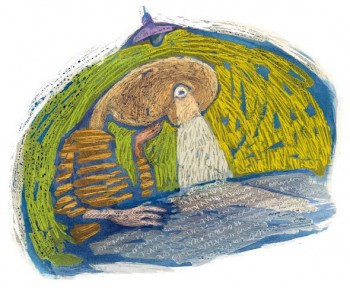
A reader doesn’t have to understand anything on the first try. You can always put a book aside and see if the second read will help. If the second, third, fourth, or even fifth read doesn’t help, that’s still all right. What is this constant compulsion to understand everything? There’s nothing wrong with not understanding – on the contrary, it is precisely the state of baffled befuddlement that hides the hope of light within it. I can’t understand any of this! I’m having fun! the reader happily exclaims, and goes on with his life, eyes overflowing with light. More…
A day at the zoo
23 December 2009 | Children's books, Fiction
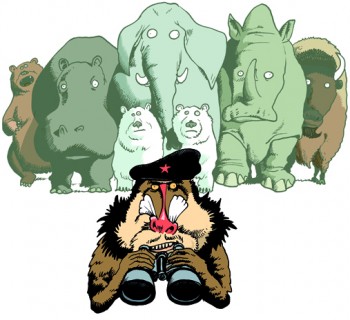
Extracts from the children’s book Zoo – eläimellinen tarina (‘Zoo – a bestial story’, WSOY, 2009, illustrated by Pertti Jarla)
The place: A zoo, once the property of the city, now privatised and accountable to corporate stockholders
The characters: The animals of the zoo, in particular Gandhi, a Sumatran tiger (false-teeth, poor vision, pacifist), Che, a male mandrill baboon (militant), and Mother Teresa, a hammer-headed bat (elderly); the zookeeper Sihvonen (stands up for the animals, recently fired); the new zoo director (whose main goal is to maximise profits); the shareholders’ committee (awaiting their earnings)
The action: after a demonstration in which all the animals played dead, the animals are staging a revolution to demand that Sihvonen be reinstated
![]()
The animals crowded into the foyer. The hallway was full of every kind of creature, with all of their skin, fur and feathers steaming in the warm indoor air. Che stood at the top of the the stairs, looked down at his troops, and gave the order in mime for everybody to be quiet.
‘Reconnaissance?’ he said, his voice subdued.
‘Ready!’ the leaf-tailed geckos announced.
‘Head in!’ Che commanded. More…
A door to the other side
7 September 2012 | Extracts, Non-fiction
Building bird-houses is author Jyrki Vainonen’s hobby: he has crafted dozens of nesting boxes and hung them on trees for winged tenants. Roaming in the woods may be bring surprises, though: the bird-house man suddenly finds the world underfoot opening up or a moment… An extract from the collection of stories Linnunpöntön rakentaja (‘Builder of bird-houses’, Atena, 2012)
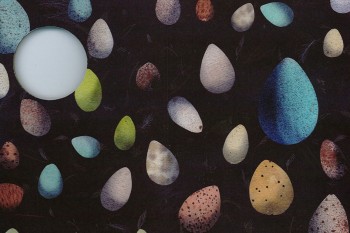
Birds coming up… Inside front cover of Linnunpöntön rakentaja by Elina Warsta/Solmu
The hinge was rusty, but after a cleaning and oiling it seemed to work, and didn’t even squeak. I had found it in a piece of board that was lying beside the road on the way to the dump. The board may have once served as part of a door frame.
The next day I rode my bike there again and unscrewed the hinge from the board, and now it looked quite handsome attached to the side wall of the birdhouse. I set the still floorless, roofless box upright and tried the door, opening the clasp and lifting the side wall on its hinges. It worked well, didn’t jam or make any sound. Next I attached the pieces of wood I’d already cut to form the roof and floor of the birdhouse. I inserted the floor and nailed through the three walls of the box – all except the wall that formed the door. Then I nailed the roof in place with several nails.
Now I had a box that would make it easy to watch the life inside. It would doubtless be wonderful to be able to see the nest from so close, and from the side rather than the top, as I usually had before. I could take photos, too. More…
In pursuit of a conscience
19 March 2012 | Drama, Fiction
‘An unflinching opera and a hot-blooded cantata about a time when the church was torn apart, Finland was divided and gays stopped being biddable’: this is how Pirkko Saisio’s new play HOMO! (music composed by Jussi Tuurna) is described by the Finnish National Theatre, where it is currently playing to full houses. This tragicomical-farcical satire takes up serious issues with gusto. In this extract we meet Veijo Teräs, troubled by his dreams of Snow White, who resembles his steely MP wife Hellevi – and seven dwarves. Introduction by Soila Lehtonen

Dictators and bishops: Scene 15, ‘A small international gay opera’. Photographs: The Finnish National Theatre / Laura Malmivaara, 2011
CAST OF CHARACTERS
Veijo Teräs
Hellevi, Veijo’s wife and a Member of Parliament
Hellevi’s Conscience
Rebekka, Hellevi and Veijo’s daughter
Moritz, Hellevi and Veijo’s godson
Agnes af Starck-Hare, Doctor of Psychiatry
Seven Dwarves
Tom of Finland
Atik
The Bishop of Mikkeli
Adolf Hitler
Albert Speer
Josef Stalin
Old gays: Kale, Jorma, Rekku, Risto
Olli, Uffe,Tiina, Jorma: people from SETA [the Finnish LGBT association]
Second Lieutenant, Private Teräs, the men in the company
A Policeman
Big Gay, Little Gay, Middle Gay
William Shakespeare
Hermann Göring
Hans-Christian Andersen
Teemu & Oskari, a gay couple
The Apostle Paul
Father Nitro
Winston Churchill
SCENE ONE
On the stage, a narrow closet.
Veijo Teräs appears, struggling to get out of the closet.
Veijo Teräs is dressed as a prince. He is surprised and embarrassed to see that the audience is already there. He seems to be waiting for something.
He speaks, but continues to look out over the audience expectantly.
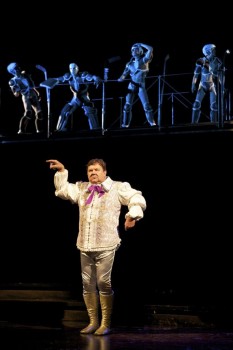
Snow White's spouse, Veijo (Juha Muje), and the dwarves. Photo: Laura Malmivaara, 2011
VEIJO
This outfit isn’t specifically for me, because… I mean, it’s part of this whole thing. This Snow White thing. I’m waiting for the play to start. Just like you are. My name is Veijo Teräs and I’m playing the point of view role in this story. Writers put point of view roles like this in their plays nowadays. They didn’t use to.
Just to be clear – this isn’t a ballet costume. I’m not going to do any ballet dancing, but I won’t mind if someone dances, even if it’s a man. Particularly if it’s a man. But I don’t watch. Ballet, I mean. Not at the opera house, or on television, or anywhere, and I have no idea why we had to bring up ballet – or I had to bring it up – because this is a historical costume, so it’s appropriate. This is what men used to wear, real men like Romeo and Hamlet, or Cyrano de Bergerac. But we in the theatre these days have a hell of a job getting an audience to listen to what a man has to say when he’s standing there saying what he has to say in an outfit like this. People get the idea that it’s a humorous thing, but this isn’t, this Snow White thing, where I play the prince. Snow White is waiting in her glass casket, she died from an apple, which seems to have become the Apple logo, Lord knows why, the one on the laptops you see on the tables of every café in town. More…
In a class of their own
31 December 2006 | Children's books, Fiction
Extracts from the children’s book Ella: Varokaa lapsia! (‘Ella: Look out for children!’, Tammi, 2006). Interview by Anna-Leena Nissilä
There was a large van in the schoolyard with a thick cable winding its way from the van into the school. It was from the TV station, and the surprise was that they wanted to do a programme about our teacher, believe it or not.
The classroom was filled with lights, cameras, and adults.
‘Are you the weird teacher?’ a young man asked. He had a funny, shaggy beard and a t-shirt that said ‘errand boy’.
‘Not nearly as weird as your beard,’ our teacher answered.
‘Can we do a little piece about you?’ the errand boy asked.
‘Of course. A big one even. I’ve been expecting you, actually. Is it some educational programme?’
‘Not exactly.’
‘A substantive discussion programme, though?’
‘Not exactly.’
‘A documentary about our contemporary educators?’
‘Not quite.’ More…
Dog days
30 September 2008 | Fiction, Prose
A story from Avantgarderob ja muuta irtaimistoa (‘Avantgarderobe and other moveables’, Tammi, 2008). Introduction by Soila Lehtonen
The air between the old dog’s teeth cuts like a crosscut saw.
There is a furious rhythm in her bark.
She’s been left out of the moose-hunting pack.
The more decrepit her body is, the stiffer her joints, the more her bark is filled with passion for the hunt. But she shows no sign of nostalgia, she’s not hankering after some long-ago days of glory, when she was the leader of the pack. This is clearly a bark of command. Even from kilometres away, she tells the other dogs where to go — not that way — a little more to the left — behind that stump, you blockheads! More…
Our favourite things
29 January 2010 | Letter from the Editors
Every reader has his or her favourite book. It is possible to define, with acceptable criteria, when a work of fiction is ‘a good novel’: do the plot, characterisation and language work, does it have anything to say? But when is a ‘good’ novel better than another ‘good’ novel? More…
Garden graft
2 September 2010 | Essays, Non-fiction
A chapter from Vapaasti versoo. Rönsyjä puutarhasta (‘Freely sprouting. Runners from the garden’, Kirjapaja, 2010)
If you sit in your garden and feel a bit like you’re tucked uncomfortably at the end of the dock in a guest berth, the reason is this: the garden hasn’t yet found a place in your muscle memory. Because it is only at the point when the garden has settled into your muscle memory, into your senses in as many ways as possible, that it will feel like your own. And that, of course, takes working in the garden, not just sitting in it.
So you should know your rose – not just its lovely smell but also the memory that you get from the shovel handle of when you planted it, or even the memory of the prick of its thorn on your finger. You can anchor every little detail in your senses, and it doesn’t even take much imagination. The scent of thyme on your fingertips, the downy fluff of a pasque flower against your palm, the silken glow of a peony opening in the morning sunlight – or the sumptuous mist of the wee hours of a summer morning twining over everything, and the rare experience of wading through it. More…


